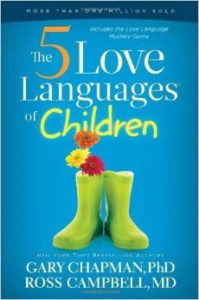 When we love deeply, we express it in many ways–a thoughtful gesture, a loving touch, a heartfelt note or simply altering our schedule to ensure time spent together. Yet all too often, these expressions go unacknowledged. Even worse, they can occur without ever making a difference. Spouses, children and lovers complain of feeling unloved, unnoticed and unimportant. Communication is the holy grail of interpersonal connection and is especially elusive when parenting kids after trauma. Connection, we know, is the channel for love, self-regulation and for healing. Until our children feel love, they will continue to languish and will resist our attempts to influence, discipline or connect with them. We are left puzzled and frustrated.
When we love deeply, we express it in many ways–a thoughtful gesture, a loving touch, a heartfelt note or simply altering our schedule to ensure time spent together. Yet all too often, these expressions go unacknowledged. Even worse, they can occur without ever making a difference. Spouses, children and lovers complain of feeling unloved, unnoticed and unimportant. Communication is the holy grail of interpersonal connection and is especially elusive when parenting kids after trauma. Connection, we know, is the channel for love, self-regulation and for healing. Until our children feel love, they will continue to languish and will resist our attempts to influence, discipline or connect with them. We are left puzzled and frustrated.
Often a behavior that feels loving to one person may be totally ineffective for the other. It is like a radio station that is improperly tuned in; one hears lots of static an occasional word, but the core message is lost in translation.
Gary Chapman’s landmark book, The Five Love Languages, provides a remedy to this communication mismatch and handle this dilemma. It allows us to move beyond the desire to connect and find a way that fulfills our intention. Our default inclination is to express love in the ways in which we most like to receive it. But, to increase the likelihood that our loved ones experience our expressions of love, we must communicate in their love language. We are called to step out of our comfort zone and engage through their love language.
 The 5 Love Languages that Chapman identifies are:
The 5 Love Languages that Chapman identifies are:
Words of Affirmation
Quality Time
Receiving Gifts
Acts of Service
Physical Touch
If you are a person who hungers to hear, “I love you,” you probably speak these words frequently with the expectation that your child/spouse/partner will get the message. But if words of Affirmation are not their language or they are uncomfortable verbalizing feelings their need will remain unfulfilled. One of you is broadcasting on AM and the other on FM.
What is the solution? First determine the love language for each family member, then INTENTIONALLY choose to switch to their channel. For example, if a child “hears” in Acts of Service, connect in his dialect. Perform small gestures–fluff her pillow, rub her feet, run a bubble bath, bake cookies, prepare her favorite food. Be creative not necessarily grand. Make sure your body language aligns with your intention. Thoughtfulness is key and deliver with a smile. If this feels like too much work, negative emotions will shine through and nullify your efforts.
Consider each language. Determine which is your preferred style and then do the same for every family member and significant relationship in your life. What do you notice? Which languages meld easily with your communication style? Which requires more effort, discipline and practice. What patterns do you notice between Love Language-comfort level and relationships that feel like less work?
 Help family members to identify each other’s languages. Practice intentionally connection using each person’s channel. Notice what works best for both of you. As you all become familiar with the process, communication will become easier. You become attuned with one another. When under stress, you’ll likely fall back to your own preferred channel. If you feel disconnected, review recent interactions and do a “language” check. Perhaps it is time to recommit to speaking their language and to “translate” your intentions into their dialect. Reset and re-engage.
Help family members to identify each other’s languages. Practice intentionally connection using each person’s channel. Notice what works best for both of you. As you all become familiar with the process, communication will become easier. You become attuned with one another. When under stress, you’ll likely fall back to your own preferred channel. If you feel disconnected, review recent interactions and do a “language” check. Perhaps it is time to recommit to speaking their language and to “translate” your intentions into their dialect. Reset and re-engage.
Chapman has written several books that address this topic and then fine tunes it to different ages/groups. The five love languages are consistent, but he elaborates on strategies for implementing effective connection. Check them out. You just might find discover an important tool. Commit to the love language approach not only with your children, but also with your partner. Remember, happy, emotionally connected parents are the hub of a happy, emotionally connected family. The need to be valued and loved is primal and one of the most important gifts you can share. The Five Love Languages is one way of growing your intentional family together.



Love these books! they make so much sense and provide great insight as to how we can improve our relationships. #adoptiveparenting